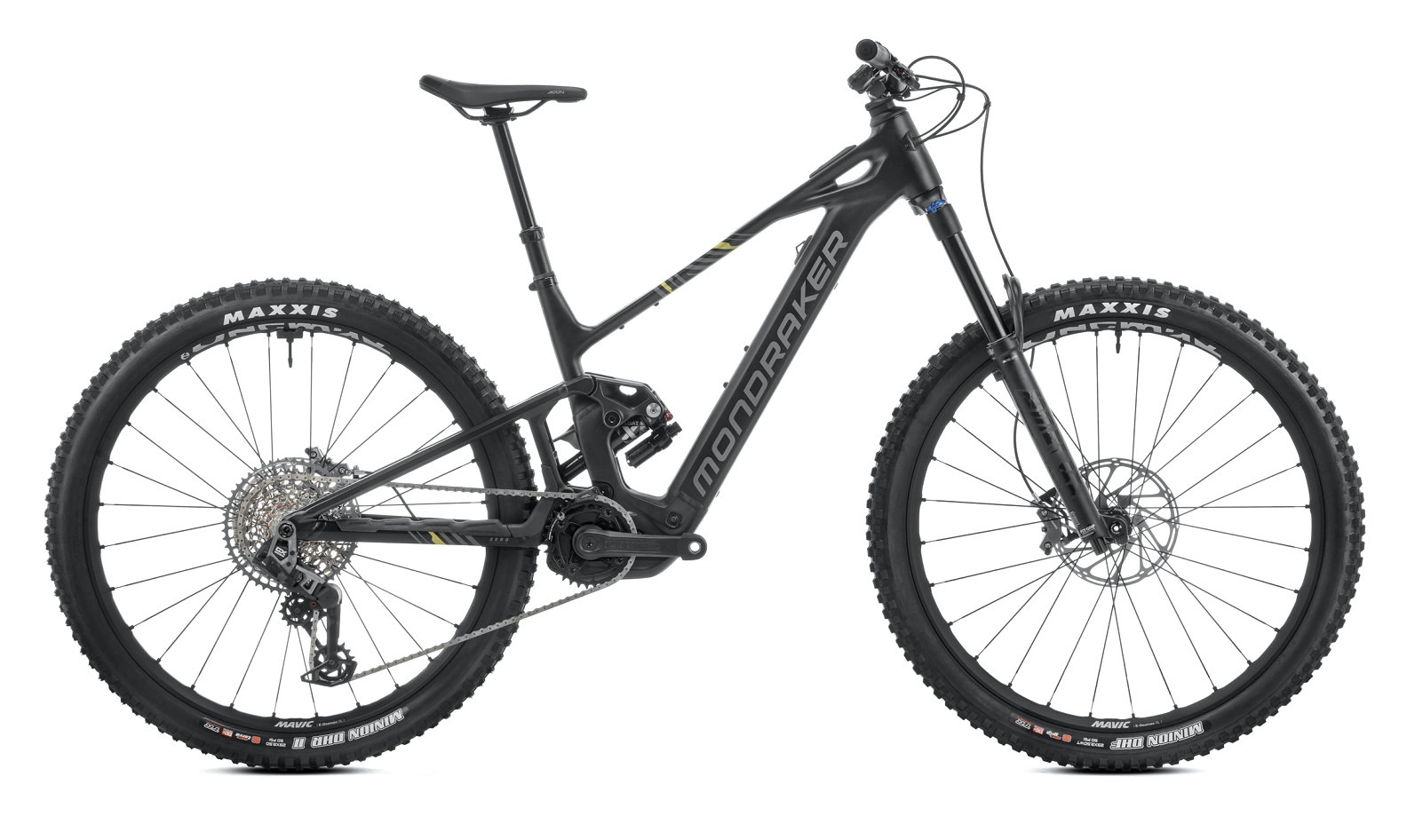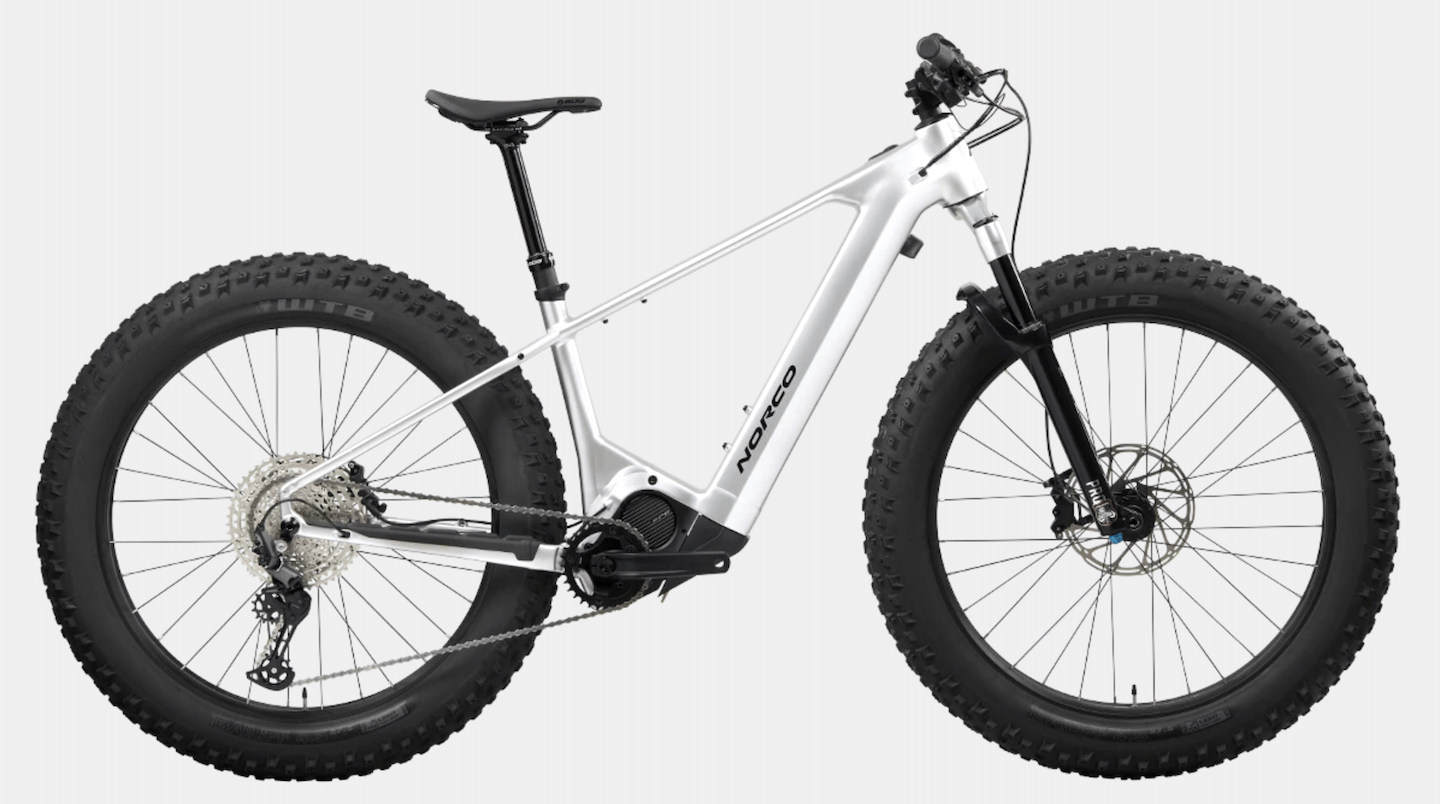May 27, 2022 - A new Ipsos survey finds that most adults across 28 countries consider cycling plays an important role in the reduction of carbon emissions (on average, 86% do so) and in the reduction of traffic (80%). However, half (52%) say cycling in their area is too dangerous.
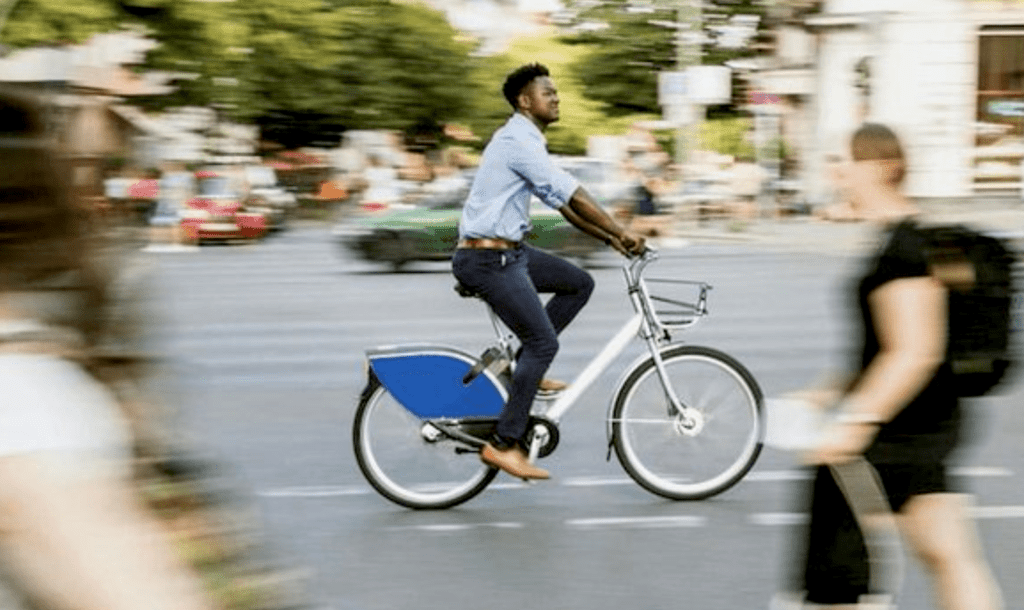
The prevalence of cycling to run errands or to commute is highest in countries where it is most widely perceived as a safe mode of transportation such as China, Japan, and the Netherlands. In most countries surveyed, a solid majority of citizens are in favor of giving bicycles priority over automobiles in new infrastructure projects.
Globally, fewer adults report typically using a bicycle for a 2-kilometer/1-mile trip in their neighborhood (14% on average) than walking (37%) or driving (25%). However, cycling is the most common mode
of transportation for short local trips in the Netherlands (45%) and China (33%) and is also widely used in Japan (27%), India (21%), Germany (21%), and Belgium (20%).
As many as 30% of adults in the Netherlands, 22% in China and India, and 20% in Sweden report riding a bicycle to get to their place of work or education. In contrast, only 4% in Canada, and 5% in South Africa, the United States, and Great Britain do so.
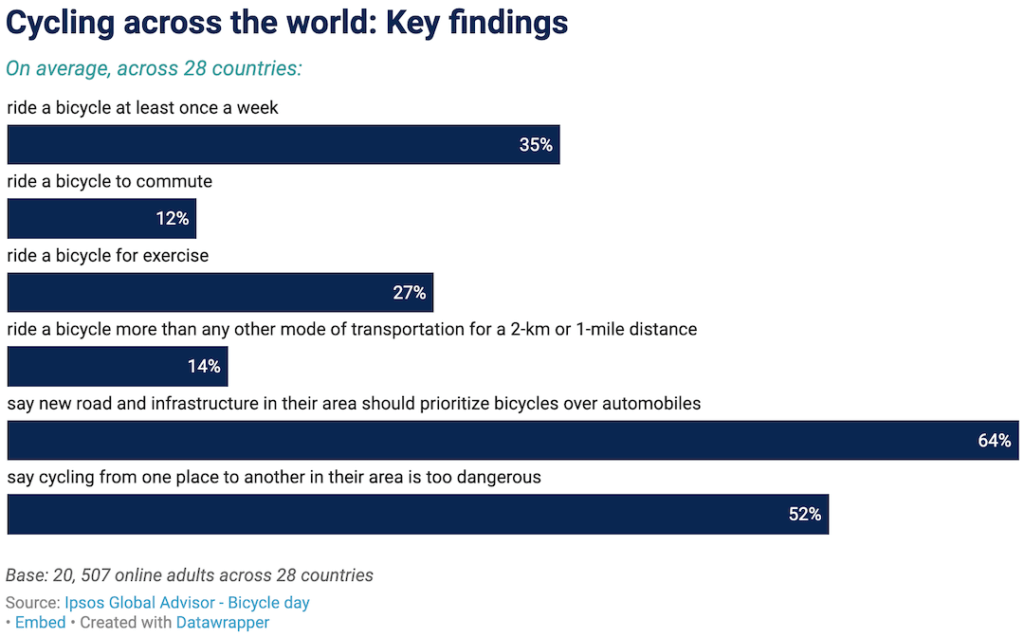
On average globally, twice as many say they ride a bicycle for exercise (28%) than for commuting (12%). Cycling for exercise is most widely practiced in Poland where 61% report doing it.
Across the 28 countries, almost two-thirds (63%) of adults say they know how to ride a bicycle and 42% report owning one. The Netherlands, Poland, and Sweden show the highest levels of bicycle ownership. Usage of public bicycle-sharing systems averages at 8% per country, but it is much higher in China (38%), India (19%), South Korea (15%), and Turkey (15%).
The proportion of cyclists does not differ greatly among major demographic groups. The prevalence of weekly cyclists is only slightly higher among those who are male, younger, urban, more affluent, and highly educated than it is among those who are not. However, one group stands out: business decisionmakers.
On average, 55% of them ride a bike at least once a week vs. 35% of all adults.
These are some of the findings of a survey of 20,057 adults under the age of 75 conducted between March 25 and April 8, 2022 on Ipsos’s Global Advisor online survey platform.
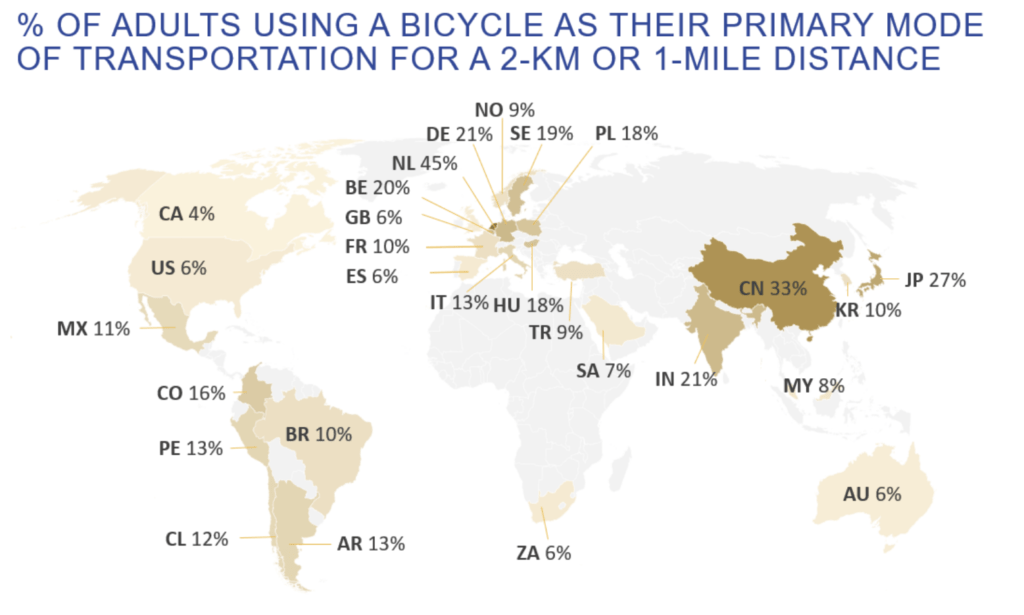
Cycling as a solution
Large majorities in all countries agree that cycling plays an important role in the reduction of carbon emissions (from a high of 94% in Peru and China to a low of 77% in Germany) and the reduction of traffic (from 94% in Peru to 62% in the U.S.).
Furthermore, cycling enjoys a higher level of favorability than do all other forms of transportation – a global average of 82% view bicycles favorably vs. 74% for automobiles, 73% for e-bikes, 59% for motorcycles or mopeds, 53% for standup scooters and 43% for trucks.
Countries where bicycles are most favored over cars are Turkey, the Netherlands, Hungary, Chile, Argentina, Belgium, Colombia, and Peru (all by 15 percentage points or more). Only four of the 28 countries show a significantly higher level of favorability for automobiles than for bicycles: Australia, the U.S., Great Britain, and Canada.
Bicycles are viewed favorably in all countries (from 93% in Poland to 64% in Great Britain) as are ebikes (from 84% in India to 57% in Great Britain). In contrast, other types of vehicles are not viewed as kindly in some countries: standup scooters are seen favorably by only 17% in Japan (vs. 79% in India), motorcycles and mopeds by only 23% in South Korea (vs. 85% in India and 79% in Malaysia), and trucks by 24% in Turkey and 28% in China (vs. 70% in the U.S.).
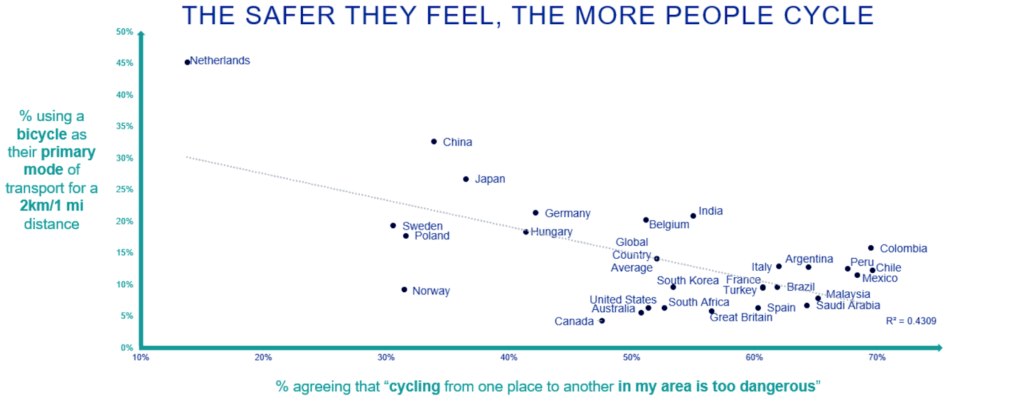
Prioritizing bicycles
In this context, twice as many agree as disagree (64% vs. 36%, on average per country) that new road and traffic infrastructure projects in their area should prioritize bicycles over automobiles. Support is higher than average in all emerging countries surveyed. The only countries where fewer than 50% agree are Canada, the U.S., Australia, Japan, and Great Britain while opinions are evenly split in Belgium and Norway.
Support for prioritizing bicycles in infrastructure prevails where large majorities agree that “cycling from one place to another in my area is too dangerous”, including all countries surveyed across Latin America and Southern Europe as well as Malaysia and Saudi Arabia.
About the Study
These are the findings of a 28-country Ipsos survey conducted March 25 – April 8, 2022, among 20,057 adults aged 16-99 in Norway, 18-74 in the United States, Canada, Malaysia, South Africa, and Turkey, and 16-74 in 22 other countries, via Ipsos’s Global Advisor online survey platform. Each country’s sample consists of ca. 1,000 individuals in Argentina, Australia, Brazil, Canada, China (mainland), France, Germany, Great Britain, Italy, Japan, Spain, and the United States, and ca. 500 individuals in Belgium, Chile, Colombia, Hungary, India, Malaysia, Mexico, Norway, the Netherlands, Peru, Poland, Saudi Arabia, South Africa, South Korea, Sweden, and Turkey.
The samples in Argentina, Australia, Belgium, Canada, France, Germany, Great Britain, Hungary, Italy, Japan, the Netherlands, Norway, Poland, South Korea, Spain, Sweden, and the United States can be taken as representative of these countries’ general adult population under the age of 75.
The samples in Brazil, Chile, China (mainland), Colombia, India, Malaysia, Mexico, Peru, Saudi Arabia, South Africa, and Turkey are more urban, more educated, and/or more affluent than the general population. The survey results for these markets should be viewed as reflecting the views of the more “connected” segment of their population.
The data is weighted so that each market’s sample composition best reflects the demographic profile of the adult population according to the most recent census data.
The Global average reflects the average result of all the countries and markets where the survey was conducted that year. It has not been adjusted to the population size of each country or market and is not intended to suggest a total result.
Where results do not sum to 100 or the ‘difference’ appears to be +/-1 more/less than the actual, this may be due to rounding, multiple responses, or the exclusion of don’t knows or not stated responses. The precision of Ipsos online polls is calculated using a credibility interval with a poll of 1,000 accurate to +/- 3.5 percentage points and of 500 accurate to +/- 4.8 percentage points. For more information on Ipsos’s use of credibility intervals, please visit the Ipsos website. The publication of these findings abides by local rules and regulations.
Read more here.
About Ipsos
Ipsos is the world’s third largest market research company, present in 90 markets and employing more than 18,000 people.
Our passionately curious research professionals, analysts and scientists have built unique multispecialist capabilities that provide true understanding and powerful insights into the actions, opinions and motivations of citizens, consumers, patients, customers or employees. We serve more than 5,000 clients across the world with 75 business solutions.
Founded in France in 1975, Ipsos is listed on the Euronext Paris since July 1st, 1999. The company is part of the SBF 120 and the Mid-60 index and is eligible for the Deferred Settlement Service (SRD).










